Macao:Chinese leader Xi Jinping met Thursday with Macao’s new chief executive amid celebrations of the 20th anniversary of the former Portuguese colony’s handover to Chinese rule.
City leaders put the tiny gambling enclave of just 632,000 people on security lockdown, including barring political activists and journalists from nearby Hong Kong, which has been wracked by months of often-violent anti-government protests.
Even without the heavy security, Xi would likely have seen little in the way of protests or calls for greater democracy or self-rule. Unlike Hong Kong, whose former British leaders nudged their colony gradually toward greater democratic freedoms, Macau’s small size, ineffectual rule by Lisbon and the overriding influence of the tycoons who control gambling and related businesses kept democratic expectations low.
And with the opening of the casino industry to new players and a massive influx of Chinese gamblers, Macao’s economy has boomed in the two decades since 1999. Organized crime groups who had battled each other on Macao’s streets and in its gambling halls have also been brought to heel, leading to a rise in tourism and a general sense among many that their fortunes have improved under Chinese rule.
Read more:Money talks: Hong Kong protesters weaponizing spending power
That feeling of optimism is largely absent in Hong Kong, which reverted from British to Chinese rule in 1997 and where frustrations over a stagnant economy and astronomical housing prices helped fuel the protests that at times drew an estimated quarter of the population of 7.5 million people. Beijing’s refusal to respond to their demands, including direct elections for the chief executive and legislative council, has led to a 7-month standoff, with more protests expected for this weekend.
Both Macao and Hong Kong are run under a “one country, two systems” framework, which allows them to retain their own legal and economic systems, while Beijing exercises strict control over their political leadership. Macao also enacted national security legislation that has been stalled in Hong Kong by popular opposition.
Despite that, Xi told members of law enforcement Thursday that they needed to “increase awareness of nation ... and be highly vigilant."
